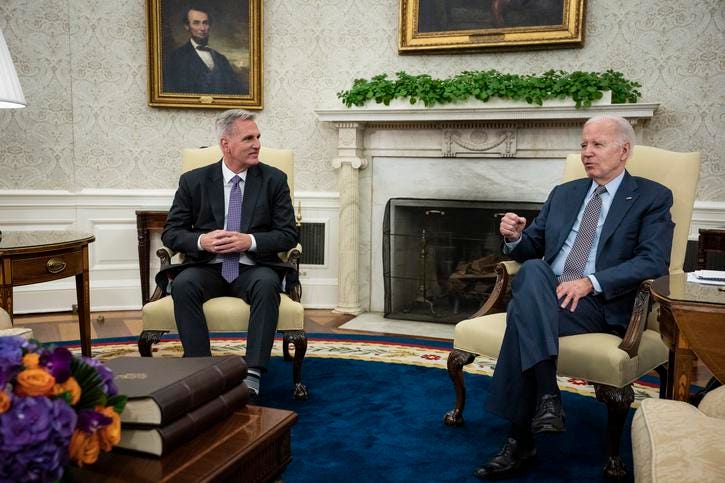WASHINGTON, DC – MAY 22: U.S. President Joe Biden meets with House Speaker Kevin McCarthy (R-CA) in … [+]
At last the debt ceiling debacle looks close to being over. At least until the next time.
It’s the worst political theatre possible and it happens time after time after time.
Yet somehow much of the media always goes for the most unlikely result. Specifically, the message is simple:
- Failure to raise the U.S. debt ceiling will result in America’s first default ever on its debt — the best debt in the world, apparently — and that event will quickly knock the dollar off its high pedestal and quickly pauperize Americans. End of story.
Of course, the fact has long been that the U.S. has never defaulted. Never, meaning not ever. The whole show is theatre of the worst type: Its predictable and therefore boring.
The script is always the same. Two leading political figures go head-to-head with stoney-faces and promise their followers that they alone can get the other to sweat. Neither has any incentive to act until the last minute, and the media laps up the perceived tension.
Then, as if by magic, the two opponents strike a deal with just days to go. The debt ceiling gets lifted. And the event is forgotten.
Of course, the promises offered to secure a deal mean that sooner or later the two parties go head-to-head for more political theater.
In short, tis a Washington DC theater production made with your tax dollars.
So what do investors need to know? These facts should help.
- Every time the national debt approaches its approved ceiling level a deal has been struck to avoid default.
- The U.S. has never defaulted and those in charge know that America’s prosperity is in significant part due to the lack of default. They know that a default would be economically disastrous.
- Much of the media loves to make the political theater into life-and-death drama. That helps them, but not you.
- The losers in the whole thing are the anxiety-ridden cable-news viewers who get drawn in to the drama and spectacle.
- If the market gets sucked into the theatrical malaise and stocks fall — which didn’t happen this time — then savvy investors use the opportunity to buy cheaper stocks.
In simple terms, investors should largely ignore the Washington DC drama and instead focus on finding good long-term investment opportunities.


